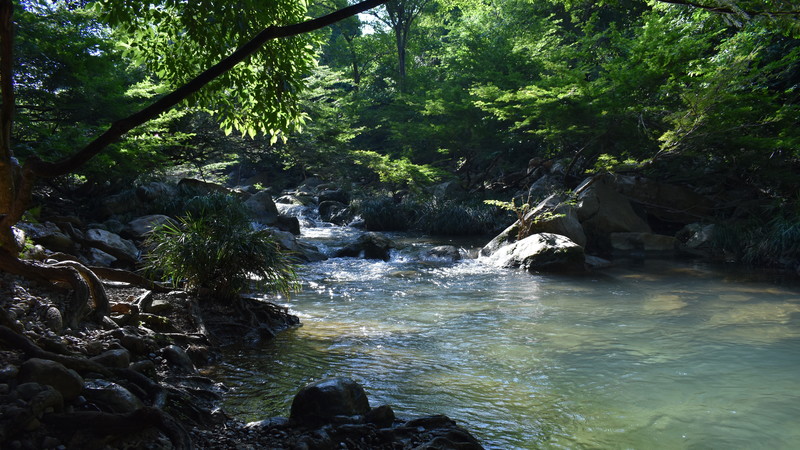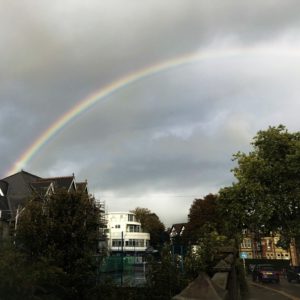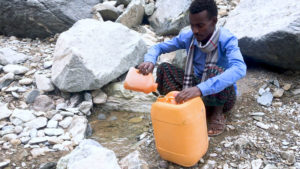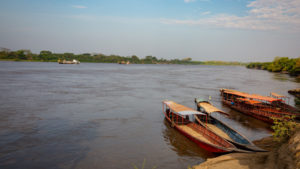Laudato Si’ week: Water is the source of life

This Laudato Si’ week, Francis Stewart from our Theology team reflects on the importance of water in our lives, and the need to find shared solutions to common problems.
When I was young, my dad used to play me songs by the Scottish band the Waterboys. One of the songs I remember was called The Ways of Man. Mike Scott, the lead singer, lamented “I’ve had enough of the ways of man…He put his flag in the desert, but I need water!”
This lyric has always stayed with me – the metaphor of humanity putting our flag in the desert, when water is what is really needed. Water, a matter of life and death – in the face of which, our desire to conquer, to claim, to mark our territory, seems irrational.
In the Bible, water has a rich symbolism. It evokes both the beginning and the end, the source of all life and the limit of all life. In the first account of creation in the book of Genesis, one of God’s acts of creation is to hold back the waters to form dry land. This makes room for life to grow and flourish in its diversity.

Later in Genesis we hear of a great flood which indicates water’s significance in our collective consciousness as a fearful force. Eventually it subsides, and God sends the rainbow, promising to “never again destroy all flesh.” In this ancient drama, water is both a symbol of endings and new beginnings, which is why it is used in the sacrament of baptism.
A precious gift
In Pope Francis’ encyclical Laudato Si‘, water is mentioned 46 times. It is the precious gift of our sister, mother earth, through which we are refreshed. It is also useful for healthcare, agriculture, industry.
And yet, also, it is in the earth’s waters, as in the soil and the air, that we see the damage being done to the environment. There are also those who are excluded from access to clean water.

Pope Francis says that access to drinkable water is a particularly fundamental human right. This is because it is a condition for exercising many other rights. He also questions the tendency to privatise water and turn it into a commodity. Can the availability of such a fundamental good be determined by price systems?
Read and reflect on Laudato Si’
Water unites, it does not separate us
In October 2019, the attention of the church was turned to the Amazon biome for the Panamazonian Synod. The regional bishops and various experts gathered to reflect on concerns raised by around 84,000 consultations with communities from the nine different countries and the many territories of the rainforest. It was called the “child of Laudato Si’“ by the pope.
I have never visited the Amazon, but reading the Synod document gave me a small sense of the grandeur of the rainforest and the deep reverence of the peoples who depend upon it. Water is deeply significant in the Amazon. It is by its rivers and water cycles that life is interconnected and nourished.
In John’s Gospel, Jesus uses water as a symbol in many of his conversations to represent new life, a new way of belonging and relating to each other. This is based not on what divides us, but on what we share in common. The Synod drew the wider church to navigate the waters of Amazonia in this spirit, saying “water unites, it does not separate us”.
Renewing the face of the earth
Periodically, the waters in the Amazon overflow. The Synod document likens this to the “river of life-giving water” from the Book of Revelation, “sparkling like crystal flowing from the throne of God.” (22:1) We are reminded that water is a powerful and often uncontrollable force. But these images are not intended to warn us of death and destruction. Instead, they call to mind the Holy Spirit, who brings a “profound conversion of our plans and structures to Christ and the Gospel.”
The key to this metaphor is not the destruction, but the radical overturning, beyond what can be controlled. Theologian James Alison suggests that we read Revelation in this way: imagine the trials and conflicts we experience in times of crisis as like skirmishing ships. They are too busy firing canons at each other to notice the huge wave on the horizon, that will capsize them all, and renew the face of the earth. As we approach Pentecost, let’s hold onto this promise of the Spirit.

Laudato Si’ reminds us that the most urgent challenges facing humanity are common ones, requiring a shared solution – the governance of the oceans, the protection of the soil, even the prevention and containment of global pandemics. But models of progress that emphasise private wealth or centralised control prevail, squandering the riches of our shared earth.
As we think about water, a precious source and symbol of life, are we willing for our plans to be capsized? Are we ready for our structures to be turned upside down?
A timely reminder for conserving and diligently using our earthly resources.